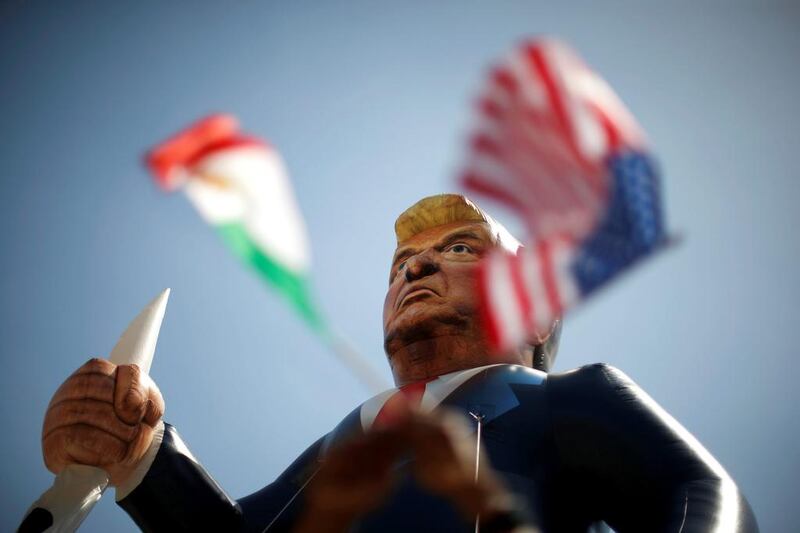Any consideration of the recent foreign policy speech by Donald Trump – and of US foreign policy trends generally – should begin with a look at the extent of the country’s global strategic and military power.
In 1993, then president Bill Clinton said that the first question asked by Washington officials when trouble started somewhere on the planet was: “Where is the nearest carrier?” Each of America’s carrier strike groups acts as a formidable expression of the United States’s interests, not least in the Arabian Gulf and most recently in the South China Sea.
Carriers represent just one aspect of US influence, projected not just militarily, but through the country’s economic heft, its dominance of Nato, its influence at the UN, its international aid budgets, its financial regulatory reach, its lead in the fields of engineering, science and technology, and its soft power incarnations in terms of global philanthropy and culture.
In the Middle East, US motivations have become blurred. The old order is unravelling and the current administration is being accused of a lack of consistency in a region that had been templated according to the reality of American influence.
Fresh nuances in US patterns of support for its traditional allies in the region, from Egypt to the Gulf states, signalled, among other things, by renewed access to western markets and investment for Iran, is creating space for locally generated diplomatic and military solutions. At the same time, the more responsible regional governments are accelerating diversification programmes as they navigate through the uncertainties of cheap oil.
The perceived lessening of America’s commitment to its traditional allies will have the effect of redirecting more trade, investment and diplomacy eastward. States emerging from under the umbrella of US influence will seek out their own ways of tackling sectarianism, fundamentalism and the re-enlivened ambitions of powers such as Iran and Russia.
Farther afield, older western alliances are weakening. A militarily depleted and conceptually challenged Nato finds its bluff being called by a resurgent Russia and worsening relations between Russia and Turkey.
The UN Security Council for its part is increasingly hampered by the divergent interests of the P5. The so-called “special relationship” between the US and the United Kingdom has been neglected.
The EU, already facing social, economic and political upheaval, is now forced to contemplate the departure of the UK, one of its most powerful members.
President Barack Obama’s appeal to the UK last week to remain within the EU was, many believe, born in part from a desire to foster an alternative western power bloc capable of dealing with its own issues instead of looking wistfully across the Atlantic for solutions.
The great US-dominated engines of western intent are beginning to lose power and purpose. Those who see themselves as at the receiving end of postcolonial blundering or the excesses of globalisation engineered by the interests of developed nations, might cheer this prospect.
But many of the older generation, who remember the benefits of US entry into two world wars, its crucial role in the demise of communism and its interventions in arenas from Kuwait to Kosovo, still see value in continued engagement by the US in world affairs.
And so back to Mr Trump. His speech displayed little in the way of consistency and vision and frequently found itself torn between isolationism and interventionism, between America First and exported Bush-era American exceptionalism.
A Trump presidency would oversee a build-up of the military, revamp America’s nuclear arsenal and obliterate ISIL. Powerful stuff intended no doubt to make the current president appear vacillating, but inconsistent when read against additional pledges to eschew nation building and abandon allies in Asia and Europe who do not contribute enough towards their own defence. Mr Trump repeated his scepticism towards intervention in the Middle East while also criticising Mr Obama for the fact that “our friends are beginning to think they can’t depend on us”.
He found himself caught between the isolationist rhetoric that played so well during the primaries and the triumphalist reminders that the US remains a key global player, capable of smiting its enemies while playing the role of “peacemaker” and helping “to save lives and indeed humanity itself”.
Those with an interest in American history will have noticed an unintended association between Mr Trump’s “America First” foreign policy theme and the isolationist America First Committee, created in 1940 to oppose involvement in the Second World War. The AFC had to be disbanded a few days after the Japanese attack at Pearl Harbor.
In the same way the US will never be able to immunise itself from global upheaval and transformation. Many in Europe used to believe this was possible, until Syrian refugees started pouring across European borders and ISIL set up operations into Libya, just the other side of the Mediterranean.
Whoever becomes US president, their task will be to recalibrate US foreign policy in a way that fits into the new world order, at the same time preserving the global safeguards and benefits that association with the world’s most powerful democracy provide.
Martin Newland is a former editor-in-chief of The National





